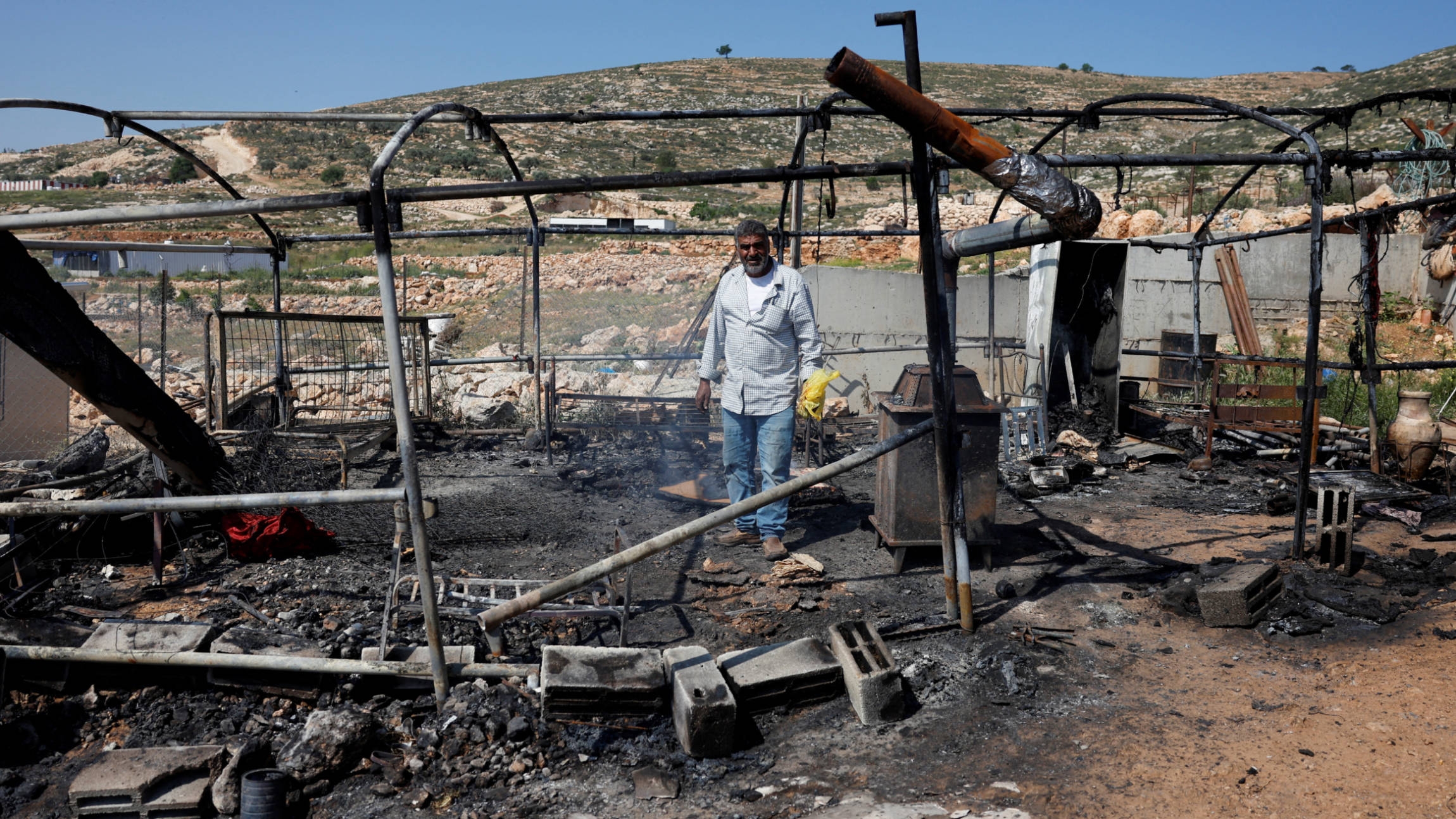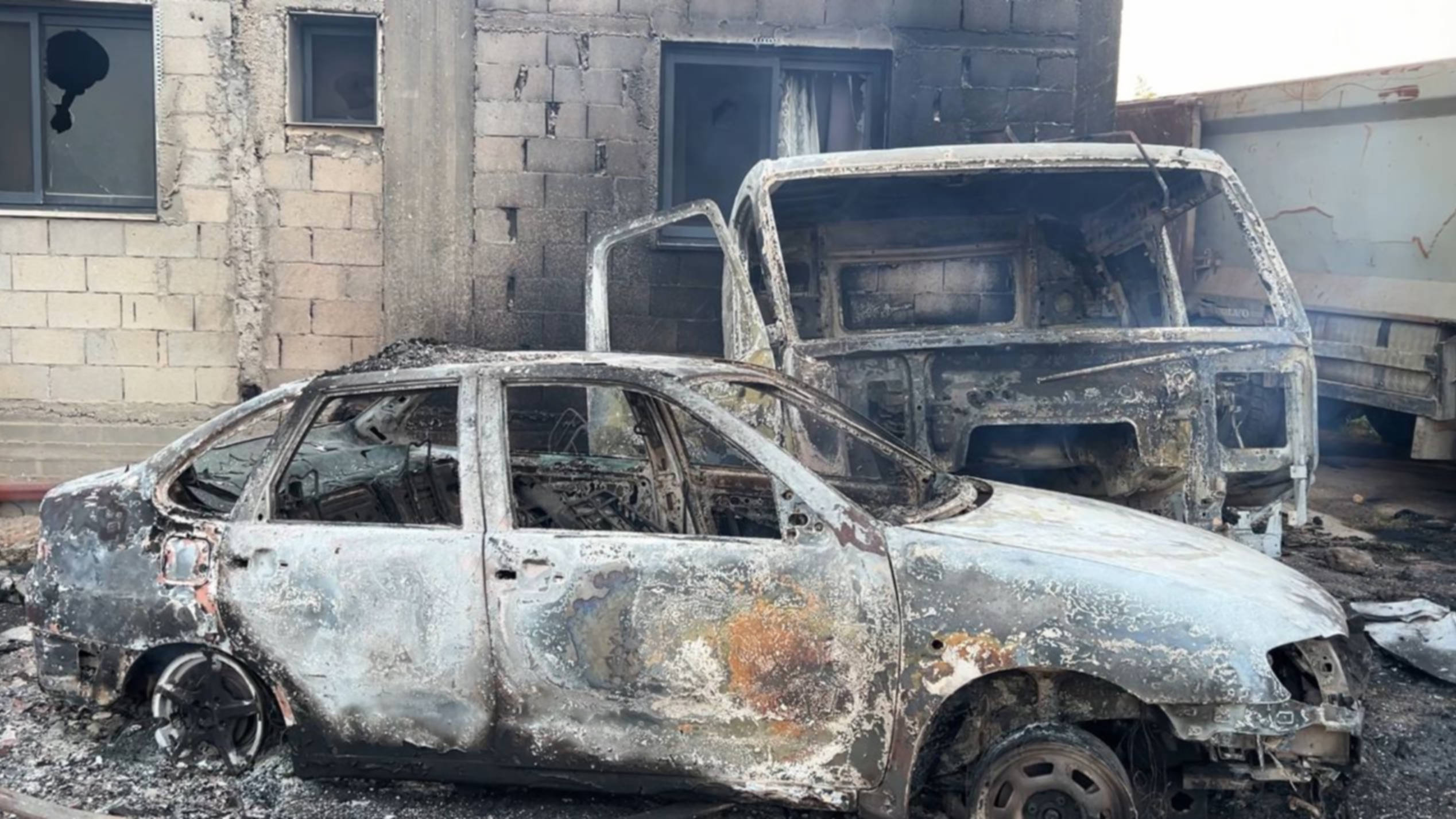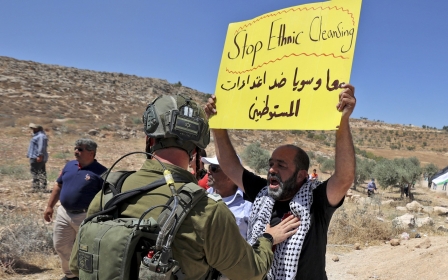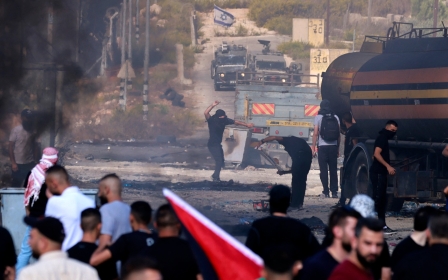Several Palestinians wounded as Israeli settlers renew attacks on West Bank

Israeli settlers on Saturday attacked villages in the occupied West Bank, wounding several Palestinians and setting fire to houses and cars, under full protection from the Israeli army.
The rampage came a day after hundreds of settlers, many of them armed, stormed the village al-Mughayyir, northeast of Ramallah, after an Israeli teenager from a nearby settlement disappeared on Friday.
Israeli Prime Minister Benjamin Netanyahu on Saturday said the missing Israeli teenager was found dead in the West Bank.
Barakat Dawabsha, a resident of Duma, south of Nablus, told Middle East Eye that more than 500 armed settlers attacked the village from the northern, western and southern sides.
He said that several people were wounded by live bullets, and dozens of homes and vehicles were burned. The settlers also attacked people with batons and stones, causing more injuries.
New MEE newsletter: Jerusalem Dispatch
Sign up to get the latest insights and analysis on Israel-Palestine, alongside Turkey Unpacked and other MEE newsletters
"The Israeli army is protecting the settlers. I saw with my own eyes one of the soldiers setting fire to a vehicle. The situation is very difficult, and the people are trying to protect their homes and properties with their bodies," said Dawabsha.
The Palestinian Red Crescent Society said Israeli soldiers prevented its crews from entering the village to provide treatment to the wounded. An ambulance was eventually allowed to enter after three hours.
According to Dawabsha, dozens of Palestinian residents of the village haven't been able to return to their homes since Friday evening due to closures imposed by the Israeli army on several villages south of Nablus and north of Ramallah as part of the search for the missing settler.
Dozens of vehicles and buses carrying settlers are still arriving at the entrances to Duma to take part in the fierce attack.
Since Saturday morning, Israeli settlers have also attacked the towns of Silwad, Turmus Aya, Sinjil and Deir Dibwan, according to Wafa.
'Most horrific attack in years'
Hundreds of settlers, backed by soldiers, attacked al-Mughayyir on Friday afternoon, shooting at residents and burning Palestinian property. One Palestinian man, identified as 26-year-old Jihad Abu Alia, was killed and 25 others were wounded, including eight by live fire, according to the Palestinian Red Crescent.
Kazem al-Hajj, one of the activists campaigning against Israeli settlements in the village, told Middle East Eye that the attack was "the most horrific in recent years".
"As soon as the village residents heard of the settlers' attack, they tried to confront them by heading to the northern area. Jihad Abu Alia was one of them, but he was hit by settlers' bullets in the head and fell to the ground immediately," said Hajj.
Abu Alia bled to death after Israeli soldiers prevented ambulances from reaching the wounded.
During the rampage, settlers set fire to more than 40 Palestinian facilities and 50 vehicles in al-Mughayyir, causing nearby agricultural lands to catch fire as well.
"The scene was terrible, clouds of smoke filled the village, and the sound of ambulances did not subside amid the intense and continuous shooting," Hajj said.
The settlers came from the Mallahi outpost, which they established over the past two years above the Jabeit Israeli army camp, which was originally built on Palestinian land north of Ramallah.
Hajj said the village has been under daily attacks by settlers "pursuing a policy of pastoral settlement to control village lands" with clear protection from Israeli soldiers.
Under lockdown
Several hours after the attack started, the Israeli army withdrew from the village, but remained at its entrances, imposing a total closure and erecting checkpoints.
Israeli forces also stormed several neighbouring Palestinian villages and conducted search operations backed by a helicopter.
'The scene was terrible, clouds of smoke filled the village, and the sound of ambulances did not subside'
- Kazem al-Hajj, activist
Overnight, five Palestinians were wounded in another settler attack, on Abu Falah village, near Ramallah, the official Palestinian news agency Wafa reported.
Journalist Mohammed Turkman said that soldiers deliberately attacked journalists while covering the settlers' attack on al-Mughayyir.
"One of the soldiers pointed at me and another one fired directly at me. Fortunately, the bullet landed next to me, but I could have been one of the wounded," Turkman told MEE.
Turkman said that the widespread attack was carried out by settlers on one side and soldiers on the other, while ambulance crews were completely prevented from approaching.
Journalists were unable to leave the village after the Israeli army withdrew and closed down al-Mughayyir and were forced to stay in Hajj's house.
"This is not the first time we have been subjected to harassment during our work. With every press coverage, soldiers try to attack us, especially if settlers are around," Turkman said.
Al-Mughayyir remained closed on Saturday, with Israeli forces preventing Abu Alia's body from being taken into the village for his funeral, forcing it to be postponed until the army removes its checkpoints.
This article is available in French on Middle East Eye French edition.
Middle East Eye delivers independent and unrivalled coverage and analysis of the Middle East, North Africa and beyond. To learn more about republishing this content and the associated fees, please fill out this form. More about MEE can be found here.





